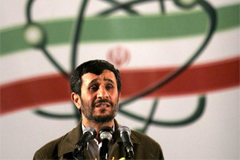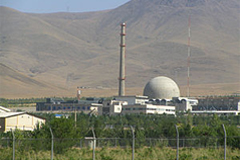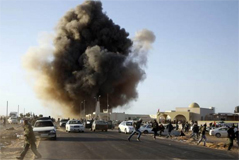News + Media
 |
Analysis + OpinionDecember 7, 2007Why believe it this time?Jim WalshBoston GlobeThis week's release of the new National Intelligence Estimate on Iran has renewed debate about American policy toward the Islamic Republic, but it also raises important questions about the state of US intelligence. Having been so wrong about weapons of mass destruction in the past, is it credible now? |
 |
Analysis + OpinionDecember 5, 2007The politics of chicken littleismBenjamin FriedmanWashingtonPost.comIt is prudent to prepare for dangers. But it is also prudent to consider the costs of excessive prudence. This holds true for both the environment and national security. |
 |
AuditDecember 1, 2007The US and Iran after the NIEFarideh Farhi, University of HawaiiThe release of the National Intelligence Estimate regarding Iran’s nuclear capabilities, intentions, and policies created shock waves as well as sighs of relief in Washington and elsewhere. The assessment that Iran stopped its weapons program in 2003, and that its declared enrichment program cannot be converted as easily or as quickly as assumed for use in a military program, immediately brought into question the notion that Iran’s nuclear program needs to be dealt with immediately and only through coercive mechanisms. |
 |
AuditDecember 1, 2007Russia: an energy superpower?Carol Saivetz, MITAs Vladimir Putin nears the end of his second term as Russian president, it is clear that energy exports have become a major component of a resurgent Russia’s foreign policy. According to the conventional wisdom, Russia’s vast resources make it a superpower to be reckoned with. |
 |
Analysis + OpinionNovember 23, 2007Violence in IraqBarry PosenNew York Times“U.S. Says Attacks in Iraq Fell to the Level of Early Last Year” (front page, Nov. 19) reports that according to the United States military, violence is down significantly in Iraq and lists some reasons. Two reasons are conspicuous by their absence. |
 |
In the NewsNovember 8, 2007Bitter Friends, Bosom Enemies: Iran, the US, and the Twisted Path to ConfrontationCIS and the Iranian Studies Group at MIT featured a public discussion with Barbara Slavin, chief diplomatic correspondent, USA Today, on her new book on Iran and the United States. Since 1996, Slavin has been responsible for analyzing foreign news and U.S. foreign policy for USA Today. She has covered such key issues as the U.S.-led war on terrorism, policy toward "rogue" states, the reform movement in Iran and the Arab-Israeli conflict. She has also accompanied two secretaries of state on their official travels and reported from Libya, Israel, Egypt, North Korea, Russia, China, Saudi Arabia and Syria. |
 |
AuditNovember 1, 2007Russia and America: is another arms race afoot?Jane MO Sharp, Kings College LondonDuring the Cold War years we learned that successful arms control agreements with the Soviet Union were those that codified parity, or at least a mutually acceptable status quo. After the collapse of the Soviet Union and the Warsaw Treaty Organization (WTO) in 1991, a much diminished Russia saw all its WTO allies and three former Soviet republics join NATO, making parity harder to achieve. |
 |
AuditNovember 1, 2007Is Port Security funding making us safer?Veronique de Rugy, George Mason UniversityThe most terrifying security threat to security experts and the public alike is nuclear proliferation. Once the figment of Hollywood imagination, the ultimate nightmare scenario that is discussed by some as inevitable is the detonation of a nuclear device on American soil. |
 |
In the NewsNovember 1, 2007After Bush: the case for restraintBarry PosenThe American InterestFrom November 2007 until election day 2008, the American Interest is examining questions of strategy, tone and tactics over a range of issues facing the next presidential administration. Barry Posen's "Case for Restraint" is first in this series. |
 |
Analysis + OpinionOctober 30, 2007An inspiration against nuclear armsJohn TirmanBoston GlobeIn 1980, she invented the call to freeze the nuclear arms race, and this simple but compelling idea - essentially, a moratorium on new nuclear weapons as a prelude to gradual disarmament - became the rallying cry for millions of people sickened by the rush to develop and deploy new nuclear weapons and missiles, space weapons, stealth bombers, and all the other expensive, provocative gadgets of the arms industry. |


